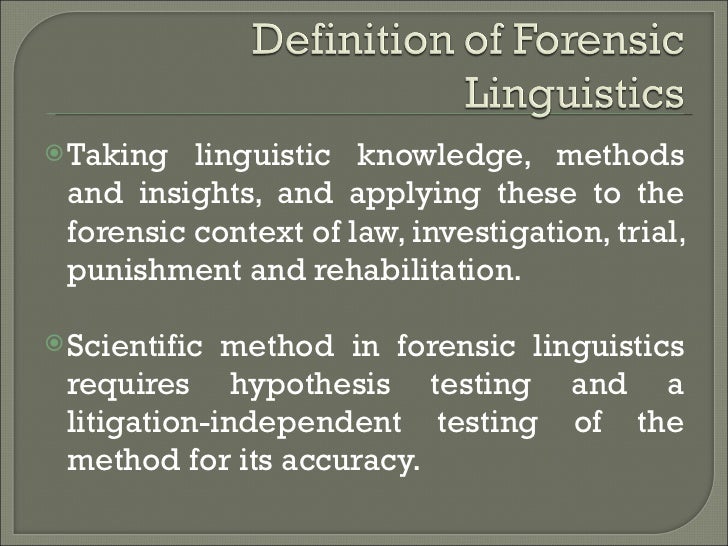

Unfortunately, Evans had already been executed in 1950. On the basis of this research and other facts, the courts ruled that Evans had been wrongly accused. Svartvik demonstrated that parts of the transcript differed considerably in their grammatical style when he compared them to the rest of the recorded interview. His analysis involved the transcript of a police interview with Timothy Evans, a man who had been found guilty of murdering his wife and his baby daughter in 1949. More than forty years ago, Jan Svartvik, a linguistic expert, showed dramatically just how helpful Forensic Linguistics can be. Forensic Linguistics serves justice and helps people to find the truth when a crime has been committed. And translators and interpreters can use this research to communicate with greater accuracy. Lawyers, judges and jury members can use these analyses to help evaluate questions of guilt and innocence more fairly. For example, police officers can use this evidence not only to interview witnesses and suspects more effectively but also to solve crimes more reliably. The results of this analysis can be used by many different professionals. One of the main goals of Forensic Linguistics is to provide a careful and systemic analysis of language. But what is Forensic Linguistics and what is its purpose? Is it only about language and the law or is it connected to other fields of practice? Where can you study it? What famous cases have used this special science? This post will answer these and other questions. Use the provided link to find further information and the relevant application form.Does language really matter? Definitely, yes! Especially in the area of Forensic Linguistics (FL), language is the key element. Tuition Explanation: The tuition is solely used to cover expenses such as lecturers, meals andĪpplications will open on.

Linguistic Field(s): Forensic Linguistics He has been cross-examined in the Central Criminal Court in London (‘The Old Bailey’) and is registered on the UK National Crime Agency’s Expert Advisors Database as a specialist in forensic linguistics. He has worked on over 100 cases involving questions of authorship, disputed meanings and language proficiency assessment, and provided investigative support and expert reports for law enforcement agencies and courts in Australia, England, Norway and Poland. He has ample casework experience, both as an expert witness and in policing contexts. He is Director of the Centre for Forensic Text Analysis at the University’s Institute for Forensic Linguistics and Programme Director on the MA Forensic Linguistics. Dr Krzysztof Kredens is a Senior Lecturer in Forensic Linguistics at Aston University. She is the President of the International Association for Forensic and Legal Linguists, a member of the Germanic Society for Forensic Linguistics, and a certified fraud examiner (ACFE). Dr Isabel Picornell is a Consultant Forensic Linguist and Director of QEDforensics, providing forensic linguistic services to the corporate, investigative, and intelligence industry.

Our lecturers are well-known members of the Forensic Linguistics community: Guided case study (analysis and presentation of findings) Authorship analysis (profiling theoretical foundations casework examples and methods faked contexts native language identification suicide notes) Disputed meanings (indeterminacy in language threads, malicious communications and defamation) The FLsc is taught by Dr Isabel Picornell and Dr Krzysztof Kredens and will take place on 24 - 26 August 2022. All sessions will be conducted in English. Special Qualifications: Basic knowledge of linguistics is required.Īs in previous years, we invite students (Bachelor’s and Master’s) as well as graduate students and postdocs from Linguistics (and its sub-disciplines), Phonetics and Phonology, Law/Legal Studies, and related fields to apply for this international interdisciplinary program. Host Institution: Heinrich-Heine-Universität Düsseldorfįocus: Forensic Linguistics, disputed meaning, authorship analysis, case studies Subject: 4th Forensic Linguistics Short Course / Germany LINGUIST List 33.1520 Fri Summer Schools: 4th Forensic Linguistics Short Course / Germany


 0 kommentar(er)
0 kommentar(er)
